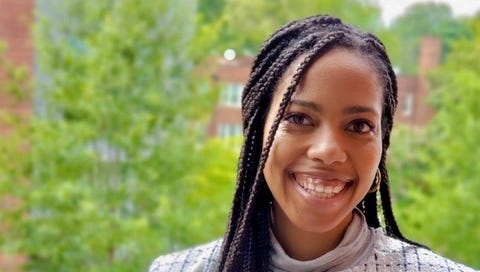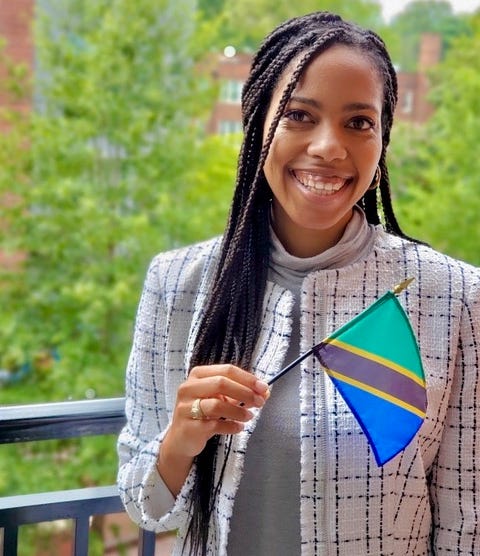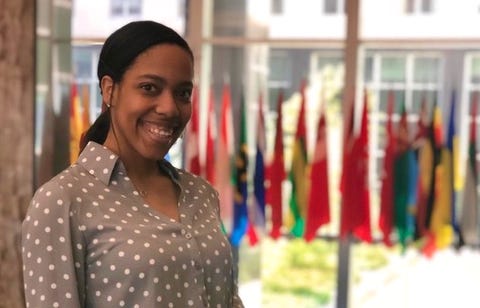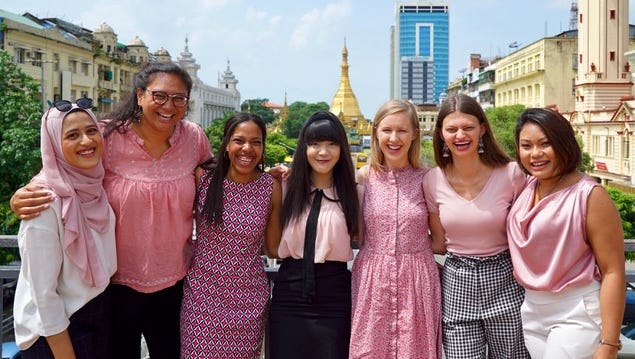In Conversation: Taylor Cofield
'When I decided to take a chance on Myanmar, I had no clue that Myanmar would also be taking a chance on me, and I’m a better FSO for it.'
Taylor Cofield found home on the mat and at the track. She found home in Madaba, Jordan, in the hallways of the Harry S. Truman building, and over tea leaf salad in Myanmar. A competitive gymnast turned collegiate pole vaulter, a young woman touched by a chance conversation with Condoleezza Rice, a foreign policy fellow who has zeroed in on nexus of security cooperation, sustainable peace and development, and gender equality. Taylor is completing Kiswahili language training in preparation for her first diplomatic assignment to Dar es Salaam, Tanzania. Please enjoy our conversation in which she reflects at length on the path behind her and the path before her.
When and how did you know you would be at home in the world?
I knew that I would be and perhaps more importantly, could be at home in the world in 2016 when my time living in Madaba, Jordan, came to an end and I tried to do just about anything to stay; a ending that was a firm contrast from the start of my very first venture outside of the United States.
I arrived in Jordan after being awarded the Critical Language Scholarship through the U.S. Department of State in order to advance my Arabic and immerse myself into Jordanian society, but I gained so much more.
However, my first two weeks in the country were overwhelming, to say the least. Suddenly, I recognized that nothing was mine any longer—not the culture I was navigating, not the family I was living with nor the home I was living in, and not the language I was attempting to communicate in. That realization required me to make a home in my newfound city with my new family, and participate in a new culture and society; and I did just that.
By the end of my stay, it was hard to believe that I hadn’t always lived in Madaba because it started to feel more like my home than my real home, in large part because I think I began to acknowledge that I was placed in Jordan for a reason and the friends and family I made would serve a larger purpose and that purpose is what I refer to as “Maktub”or the Arabic word literally translated as it is written.
For me, “Maktub” is the only word that can express this concept of destiny that I felt as I found a sense of home in Jordan; the only way to illustrate my journey to becoming a U.S. diplomat that began with a seemingly arbitrary decision to study Arabic and the pure happenstance I would end up in Madaba, Jordan—as if it had already been written. From then on, I knew I would be home anywhere.
Can you share how your early years and your upbringing impacted your dreams and desires?
I would say being a competitive gymnast from the age of five to sixteen and then becoming a collegiate pole vaulter impacted the way in which I achieved my dreams and desires. My mom placed me in gymnastics to ensure that I learned discipline and resiliency at a very young age, which meant that I would know how to manage my time, set and achieve goals, and move on when I inevitably failed or made a mistake when the time called for it.
Being a competitive athlete my entire life, especially in individual sports, fostered a sense of personal responsibility and a work ethic that could not be matched in any and everything that I’ve done.
Being in the gym or on the track for five to eight hours a day and consistently being in situations where I was expected to prepare and perform, I think really worked to my advantage in pursuing this career.
I knew at the age of 20 that I wanted to become a U.S. diplomat and here I am at the age of 24 doing it.
Everything that I’ve ever done has been intentional in order to achieve the goals that I set for myself, which without a doubt came from learning how to do so during my early years. Essentially, my upbringing was based on the understanding that if I stayed ready, I never had to get ready, which impacted how I would approach every goal or expectation of myself that I would ever have.
Was there a book, TV show or other character that you related to as a kid or teenager and which, looking back, hinted at the career path that lay before you?
Honestly, as a child, I don’t recall any shows or movies where there was representation of anyone that looked like me or that came from my background being involved in international affairs.
Therefore, prior to going to college and interacting with the State Department, really by chance, I wasn’t even aware that the U.S. Foreign Service existed and certainly, I wasn’t aware that people of color and those from non-elite socioeconomic backgrounds were engaged in that sort of work. However, as a teenager, I do remember randomly attending a lecture by Condoleezza Rice on her book, “Extraordinary, Ordinary People: A Memoir of Family,” and I remember because I may have been the youngest person in the audience, and thus I was able to meet and speak with her afterward.
In retrospect, I was captivated by her and her story because I related to her upbringing in an ordinary middle-class family that demanded excellence, but also pushed the idea that Black people, especially Black women, have to be “twice as good.” I saw that as a challenge, to be the best at whatever I decided to do, regardless of my circumstances.
While I couldn’t have predicted at the time that I would eventually join the very Department that former Secretary of State Rice led, that memory was undoubtedly a defining personal moment, which also may have hinted at the career path that lay before me, I just wasn’t aware of it yet.
Who inspires you in terms of the work you wish to pursue and/or, if this is a different person, who inspires you in terms of how they carry themselves?
Condoleezza Rice inspires me in the terms of the work I wish to pursue, as she was my first introduction into the field of national security and foreign policy.
She has exuded confidence in herself and in her ability to work on difficult issues, and to do it well. I think this largely came from the fact that she always came prepared and she’s had to perform when it mattered most.
Susan Rice inspires me in terms of how I want to carry myself as a U.S. diplomat and foreign policy professional. She is known to be an incredibly direct person, who doesn’t pull any punches and what you see quite frankly is what you get.
She nor Condoleezza Rice seek affirmation from others to be extraordinary and that is something that I greatly admire about how they carry themselves both professionally and personally, and as a young Black woman in this field, that’s a lesson that I learn and relearn every day.
Despite their political differences, I look up to them both immensely and I find great inspiration in their careers and also in some of the difficult decisions that they’ve had to make. That’s not to say that they haven’t made mistakes, but it is to say that they’ve stayed resilient through it all, and I hope to do the same. Making policy decisions is not easy, as they’ve shown the world time and time again, but they’ve kept going. As I’m early in my career, this is perhaps the most important lesson that I’ve learned and one I hope I don’t forget along the way.
Tell me about walking into the Truman building for the first time.
The first time I walked into the Truman Building was on my first day of my Pickering fellowship in the Bureau of Near Eastern Affairs, in the Office of the Arabian Peninsula, where I would soon be working on advancing U.S. relations with the Republic of Yemen, the United Arab Emirates and the Kingdom of Saudi Arabia. As I walked into the building, I remember feeling a great sense of honor just to be there at the age of 22, but I also remember feeling slightly intimidated by the vast history of the Department and the life-changing policy decisions that are made within it. I never questioned if I belonged at State or if I deserved a seat at the table, per say, but I had no clue what would be in store.
My time in the Truman building was incredibly fast-paced, required meticulous attention to detail, and I learned quickly that the reality of Foreign Service life can mean long days and repetitive conversations that end with no clear resolution.
More importantly, it was in this building where I realized that I wanted my foreign policy career moving forward to be summarized by taking the hard jobs, living in the challenging places, and addressing some of the world's most complex problems, especially those with no easy solutions.
Can you talk a bit about your support network and those people or any groups in your life that bolster your confidence or remind you of your ambition and desires?
My family, support network, and the people I surround myself with have been and continue to be an integral part of my story. I’ve been fortunate to have had people that have seen something in me and decided that they would like to mentor me or guide me as I’ve pursued this career.
I’ve also been intentional in seeking out mentors and being unafraid to reach out to people that have done the things that I want to do.
Two instances that immediately come to mind are when I reached out to Ambassador Ryan Crocker and Ambassador Gina Abercrombie-Winstanley to chat and really gain a better understanding of the career I was about to embark upon and I couldn’t think of two better people to gain insight from.
Having people that I hope to emulate believe in me has bolstered my confidence every step of the way and I’m beyond appreciative of the many people who have come into my life to support me in that way.
Also, as a 2017 Harry S. Truman Scholar and 2017 Thomas R. Pickering Foreign Affairs Fellow, my cohorts continuously remind me of my own ambition and desires.
The Truman and Pickering communities include some of our nation’s most notable public servants, and being selected to be a small part of that legacy is a constant reminder that I was meant to be here.
Being able to support my friends and peers working in the different facets of public service and policy-making and achieving their goals and dreams, really rejuvenates me and reminds me why I got into this career in the first place. Public service, as noble of a calling as it is, is not easy, and having a support system made of fellow public servants from different sides of the political spectrum and who work on various issues for the betterment of our nation and the people in it keeps me inspired and reminds me why I wanted to be a public servant.
What would you say are the three characteristics of a successful Foreign Service Officer?
I’ve had the privilege of working alongside and being mentored by successful Foreign Service Officers, and from them I have witnessed three characteristics that I believe to be crucial in simultaneously being both an extraordinary diplomat and human being.
In addition to having a basic devotion to public service and passion for foreign policy, I believe being an effective negotiator, retaining a sense of humility, and possessing analytical temperament are the most important characteristics for an FSO.
In my opinion, being an effective negotiator requires being willing and able to engage anyone from anywhere and also knowing that it is far more important to listen than it is to speak. Retaining a sense of humility is a lesson that my mother has instilled in me since I was a child and in this job, it is a reminder that there is no role or responsibility that is beneath me and more so, that should I be in a position of power, I never ask someone to do a task that I wouldn’t be willing to do myself. Lastly, being able to speak one’s opinion to power is incredibly important, but possessing analytical temperament allows an FSO to maintain the necessary objectivity to implement policy, regardless of one’s own ideological or political predisposition.
What has surprised you most about this special, early period in your career?
What has surprised me most about this special, early period in my career is that it is true what they say, that the most unexpected places are the places where you find the work to be the most rewarding.
In 2018, I took some sound advice to explore a region different from the Middle East or North Africa, and I completed my second Pickering Fellowship at the U.S. Embassy in Rangoon, Burma, working on the women, peace, and security portfolio.
Prior to going to Myanmar, I hadn’t yet traveled to East Asia and I knew little-to-nothing about Myanmar, beyond the international attention given the Rohingya refugee situation in 2017. Therefore, I wasn’t sure how I, as a Black woman, would be perceived by Burmese locals or how I would be able to really grasp the multi-faceted issues facing one of the world’s most diverse nations. However, my time working with various civil society and women’s organizations working to advance Myanmar’s inclusive democratic transition was truly inspiring.
Despite ongoing challenges, I met with women, LGBTQ, and ethnic and religious minority activists who work tirelessly within their own communities to challenge their neighbors and fellow citizens to leave their country much better than how they found it. I gained Burmese friends who graciously taught me about their culture and welcomed me, an outsider, into their homes, their pagodas, and their lives.
When I decided to take a chance on Myanmar, I had no clue that Myanmar would also be taking a chance on me, and honestly, I’m a better FSO for it. I learned that the most meaningful diplomacy doesn’t occur in an office or during a meeting, but instead occurs at a school, in a village, or over a Burmese tea leaf salad; simply put, I learned to meet people where they are.
Now, as I prepare for my first diplomatic assignment to Dar es Salaam, where I’ll be focusing on human rights, gender, and refugees, I’m hopeful that going to yet another unexpected place, this time in Sub-Saharan Africa, will be as rewarding as my time in Myanmar.
Tell me more about your interests in working at the nexus of "international security cooperation, sustainable peace and development, and gender equality." What do you think people misunderstand about this connection? I ask this because what you've outlined is at the core of my interests as well but I find there's some resistance to granting this intersection the same seriousness as it would receive if you removed the gender equity component.
I became interested in working at the nexus of security cooperation, sustainable peace and development, and gender equality during graduate school and learning from Dr. Valerie Hudson, an expert on gender and security, who greatly influenced how I approached these seemingly singular issues.
At first glance, I think many people perceive these as separate issues, one having little to do with the other, but in reality, they’re incredibly intertwined. After all, how can a community or a nation have long-term sustainable development or safeguard women’s vital freedoms without a minimal level of security? And how secure is an environment without developing responsive governance or investing in human development and human security?
These are the questions I continuously grapple with in the context of national security, especially in conjunction with the status of women and girls in times of both peace and conflict.
A take away from the works of Dr. Hudson is the idea that gender dynamics are the “first political order” of the nation-state and if that order includes an acceptable level of violence against women and girls then it is likely that we will see that use of violence or subordination impact the stability, security, and development of the state.
If we know that gender equality is a useful indicator of a state’s peacefulness, then security and development efforts and coordination must reflect that. Thus, achieving security, sustainable peace and development, and enhancing the rights of women and girls are interdependent because failing to address one will undermine efforts in another. For example, I don’t believe you can successfully promote women’s political or economic participation without addressing the formal and informal power structures (within and outside of the home) or the lack of physical security due to the use of sex and gender-based violence by state and non-state actors that prohibit their very participation. Furthermore, without women’s participation, the development of the nation is not likely to be sustainable.
Tell me where you hope to be in five years and 10 years and 20 years from now, be as general or as specific as you'd like.
I’ve always said that if the State Department is where I am able to do the most amount of good, then that is where I will stay. However, I also made the decision to join the Foreign Service at the age of 21, therefore, my interests are continually evolving, so I also am open to other opportunities to engage in meaningful public service and I will not shy away from big career moves— I have big goals that are frightening to put on paper, but when I think of the “firsts” that came before me, I wonder why couldn’t that also be me? That being said, in the next five years, I hope to have achieved tenure within the Foreign Service and return to graduate school at the end of that five year period to obtain further expertise in a regional or functional area.
Ten years from now, I’ll be around the same age that Susan Rice became one of the nation’s youngest assistant secretaries of state. Of course, following in her footsteps in that regard would be my dream ten years from now, but I’m also a person with a plan A, B, C, D, and E, so another goal of mine would be to become a Gender Advisor within the Office of the Secretary of State or Secretary of Defense, to further integrate gender perspectives into operations and missions, conflict analysis, development programming, and policy formulation.
Lastly, twenty years from now, in an ideal world, I will have the opportunity to lead a diplomatic mission, as ambitious as that sounds. I know that I’m young and that I have a lot to learn, but I’m willing to put in the work in order to achieve my goals.
Taylor Cofield currently serves as a Foreign Service Officer with the U.S. Department of State. She will soon begin her first diplomatic assignment to Dar es Salaam, Tanzania, where she will focus on human rights, gender, and refugee issues. Most recently, she held a fellowship at the U.S. Embassy in Rangoon, where she helped support Burma’s political and economic reforms through the lens of women, peace, and security. In 2018, she was also a fellow in the Bureau of Near Eastern Affairs, where she focused on advancing U.S. foreign policy in the Arabian Peninsula, with an emphasis on Yemen. Taylor is a Pickering Foreign Affairs Fellow and a Harry S. Truman Scholar, as well as an alumna of the U.S. Department of State’s Critical Language Scholarship for Arabic. She earned a Master’s degree in international affairs from Texas A&M University's Bush School of Government and Public Service and a Bachelor’s degree in political science and peace studies from the University of Missouri.
Know a Woman in Foreign Policy Who Should Join our Conversation?
Share in the comments below or email me at jennifer.koons@protonmail.com.









